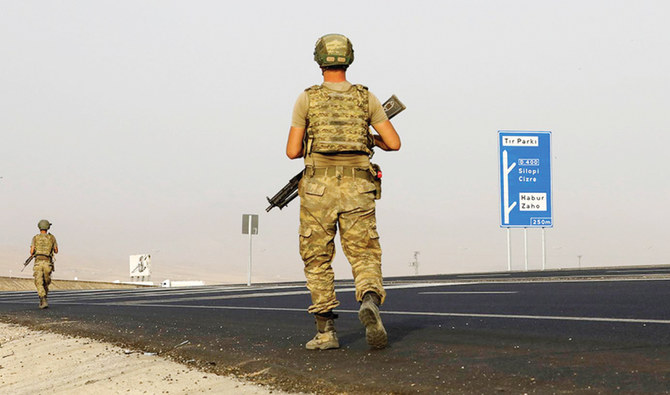ANKARA: The diplomatic crisis between Ankara and Tehran has escalated following the latest statement from Iran’s Ambassador to Baghdad Iraj Masjedi, who reiterated an opposition to Turkish military intervention in Iraq, a new move that highlights a broader rivalry between the two countries in the region.
“Turkish forces should not pose a threat or violate Iraqi soil,” Masjedi said on Sunday.
“We do not accept at all, be it Turkey or any other country, to intervene in Iraq militarily or advance or have a military presence in Iraq,” he said, calling on Ankara to withdraw its troops from Iraq and respect international borders.
“The security of the Iraqi area should be maintained by Iraqi forces and (Kurdistan) region forces in their area,” he said.
Turkey has deployed several military outposts deep inside Iraqi territories for decades to eradicate the presence of the outlawed Kurdistan Workers’ Party (PKK). Its forces conduct aerial and ground cross-border operations, which have increased in recent years.
These operations have recently drawn anger from Baghdad over territorial violations of Turkish forces and aircraft. But Ankara has continued airstrikes in the Kurdistan region of Iraq to kill senior members of the PKK.
The latest Turkish operation on Feb. 19 to free 13 nationals held captive by the PKK for many years failed in the Gara mountains in northern Iraq.
While Ankara accused the PKK of killing the prisoners during the operation, the PKK asserted that Turkey fortuitously bombed the cave where the captives were held.
The Iran-backed Iraqi militia, the Popular Mobilization Units also known as Hashd Al-Shabi, has deployed three brigades to Sinjar along the Syrian border to counter Turkish moves in the region.
Ankara summoned the Iranian envoy on Sunday following his remarks on Iraq operations. “Ankara expects Iran to support, not oppose, Turkey’s fight against terrorism,” the Turkish Foreign Ministry reportedly told the ambassador.
“The Ambassador of Iran would be the last person to lecture Turkey about respecting the borders of Iraq,” said the Turkish Ambassador to Iraq Fatih Yildiz.
Turkey recently arrested an Iranian official Mohammad Reza Naserzadeh over the killing of an Iranian dissident, Masoud Molavi Vardanjani, who was murdered in Istanbul in November 2019. This move further strained ties between Turkey and Iran.
“Turkish-Iranian relations are set to become more turbulent,” Galip Dalay, an associate fellow at Chatham House in London, told Arab News.
“Iraq still stands as the most important Middle Eastern country for Iran. The increased military presence and political leverage of Turkey in northern Iraq increasingly disturbs Iran, while the Iraqi central government would not welcome any Turkish operation into Sinjar,” Dalay added.
According to Samuel Ramani, an academic and analyst at Oxford University, Turkey-Iran relations are volatile, as phases of escalated competition and cooperation quickly follow each other.
Ramani told Arab News: “Right now, we are entering a phase of heightened competition, as Turkey sees a rising security threat from the PKK in Iraq, while Iran’s relationship with Iraqi Kurdistan has a positive moment following Iran’s most-senior commander Qassem Soleimani’s death last year.”
He added that Turkey’s expanded bilateral engagement with Iraq threatens Iran’s aspirations for hegemony, and that Iran is trying to capitalize on latent discontent in Baghdad with expansive Turkish military operations that violate Iraqi sovereignty.
“There is a broader context of tension between Turkey and Iran. Russia-Iran relations are growing in the Caspian region to counter Turkey, Ankara has arrested alleged Iranian spies and both countries are disagreeing over the situation in northern Syria, especially Ayn Issa,” he said.
Given the broader state of tensions, Ramani expects Turkey and Iran to continue having a rhetorical war of words about the legitimacy of Ankara’s anti-PKK operations and of Iran’s interference in Iraq, but direct conflict between Iranian and Turkish forces or local allies is unlikely.
But Dalay expects that a US-supported Turkish operation into Sinjar is highly likely. He said that if the ongoing crisis between Hashd Al-Shabi and Ankara escalates, Iran is likely to be drawn into this regional equation.
“Hashd Al-Shabi provides a cover to the PKK in the region, while the presence of Shingal Resistance Units, a Yazidi militia that collaborates with Hashd Al-Shabi, could trigger an international awareness about the Yazidi religious minority,” he said.

























